Every year, millions of kids wave their parents goodbye and head off to one of the country’s summer sleepaway camps, an unglamorous, exciting place where growing up without the watchful eyes of Mom and Dad becomes a common bond. But in the summer of 1998, a handful of tweens and teens opted to take this journey in front of American viewers on Disney Channel’s documentary-style reality TV show, Bug Juice.
The series described itself as “the true life adventures of kids at summer camp,” and it welcomed viewers to Maine’s Camp Waziyatah, following two bunks of campers—one boys’ cabin, and one girls’—over the course of a summer. Unlike the reality shows before it, Bug Juice swapped the booze-fueled debauchery of The Real World for authentic first-time-away-from-home drama, from homesickness to first kisses.
Videos by VICE
We watched lovebirds Connor and Stephanie navigate a budding romance. We saw Malik, a Brooklyn kid, conquer his fears on a waterski, and Caitlin, a young artist, overcome her homesickness. Then there was Asa, whose quest to earn respect as the youngest in his bunk came with its own challenges, and his sister Anna, who was fueled by outdoor adventure as much as camp gossip. The series chronicled all the iconic moments in the summer camp canon: the tribulations of sneaking candy into your cabin, the struggles of finding unity as a bunk, the camp-wide theater production, the bushwhacking and canoeing trips, and of course, the tearful goodbye that caps off the summer.
Now, 20 years after the show first aired, Disney Channel is returning to Camp Waziyatah and releasing an all-new season, following a group of 11-year-old kids and exploring how social media plays a role in the way that campers interact.
“It’s touching to see these kids on the verge of becoming young adults and sort of exploring what that means in terms of the group dynamic,” Bug Juice co-creator Douglas Ross said. “It’s something that everyone goes through, but these kids are going through it for one of the first times.”
Ahead of the revival, we talked to seven people involved in the original series—from the creators to the counselors to the campers—about the making of the Disney reality show, and what didn’t make it on screen.
Douglas Ross (co-creator): I had been a summer camper when I was growing up in Colorado. I always had very fond memories of my camp experience. But as I became a TV producer, I was thinking about the real life situations that are so ripe for turning into a documentary soap opera… and it was very clear to me that the summer camp experience was perfect for a TV show. I had the opportunity in the late fall of 1996 to sit down with the newly installed head of the Disney Channel at the time, a guy named Rich Ross.
J. Rupert Thompson (co-creator): Doug came back from his meeting with Ross at Disney saying that he sold the show in the room because Rich and Doug were talking about their camp days when they were kids, and Doug apparently said, “Well why don’t we do a documentary-style show about kids at a summer camp.” And it was just kind of one of those obvious ideas that had to be made into a show.
Ross: It was the first big real series that we had sold that was completely ours and it was one of the rare times in my career that I sold a show on a one-line pitch in the first meeting.
Thompson: The next conversation obviously was going to be: Where are we going to shoot this? There are summer camps all over the country obviously, but we needed to find a place where the kids were going to be there for a longer period of time so that we could tell their stories over an arc of 22 episodes or however many episodes we shot. We wanted to be flies on the wall and let these stories develop naturally, which meant we needed to find kids who were doing the old school four- to eight-week camp run, which is predominantly a back-East thing.
Ross: We lucked into Waziyatah. We knew that we needed to have an in at a camp in order for them to trust us enough, because a lot of trust is involved.
Thompson: I went to Noble and Greenough School in Dedham, Massachusetts, and my mentor there was Peter Kerns. Peter and his wife Penny ran Nobles’ camp and got me into the whole summer camp thing when I was maybe in ninth grade. When the time came to identify a camp, my first call was to Peter Kerns and Penny to ask if they had any suggestions. He said, “Well, it just so happens that I just bought a camp up in Maine.” That’s how we ended up at Waziyatah.
Ross: Wazi was the archetypal setting and look of a summer camp, the way that it’s situated around a lake and it had the cabins in the boys’ area and the cabins in the girls’ area and the common area. It looked like we had designed a movie set to look like a summer camp.
Thompson: We looked at their enrollment for the summer, and after we made a deal with the camp, we sent a letter with the camp to all of the families announcing that we were going to be shooting a show, just to sort of gauge the response.
Ross: With the Disney Channel, we decided that the appropriate age group was 13 and 14 years old. We limited ourselves to the kids who had really already signed up to go to Wazi that summer. We didn’t want to look for kids who were interested in going to camp because they wanted to be on TV. We wanted to find kids who were going to camp who wouldn’t mind being on TV.
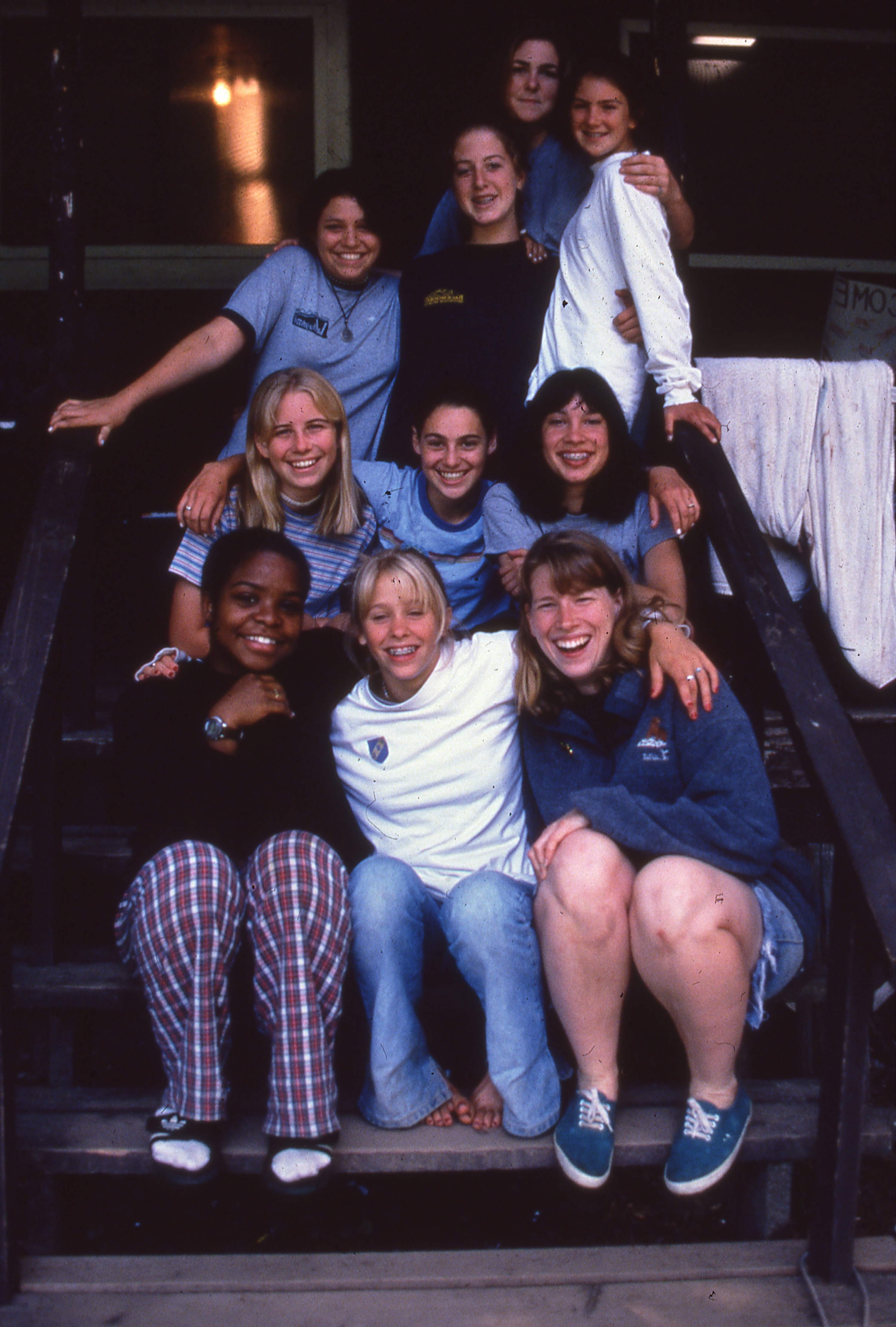
Jason Wool (camper, Grove 4 boys’ cabin): The year I was in Bug Juice was my fourth year at Wazi.
Anna Korsen (camper, Hill 5 girls’ cabin): I think I went to Wazi at least one year before Bug Juice, maybe two.
Ev Boyle (camper, Grove 4 boys’ cabin): That was my first time there. [My friend and fellow cast member] Connor, his mom kind of randomly signed him up for camp that summer, and then our moms talked and then my mom signed me up. Actually at the time, I don’t think either one of us were too happy about it. We hadn’t really gone to camp before.
Wool: As I recall, I either applied to camp late or filled out the application late, but for the previous three years I had this friend and he and I were thick as thieves at camp. We would get up to no good. Everything bad I ever did at summer camp, I did with him. He was a really fun, awesome kid, but he was also a slightly bad influence. Before we got into all this trouble, my parents got a call because I was doing all of this swearing and stuff like that. So I turned it around and tried to get things a little more under control. There was nothing too serious going on or anything, just kind of your typical summer camp misbehavior. Anyway, they didn’t kick my friend out, but they didn’t “invite him back.” I was really pissed off about it, and I remember him telling me that it was because Disney was going to be at the camp. So I was like super pissed off that my best bud wasn’t going to be there, there would be no hijinks, and it was all Disney’s fault.

Korsen: [The producers] reached out to see if it was OK if my brother Asa and I did some sort of tryout or some video interview kind of thing. They came and visited us and asked us some questions and then chose us to be in the show. We were both pretty into theater as children, so I think that was pretty exciting for us.
Wool: So I remember they sent everyone an application for the show once they [signed up for camp]. I filled mine out very snarky, like I made a lot of jokes about Disney and a lot of wisecracks, and apparently they thought it was funny as opposed to being offended. So they asked me to be in this cabin. The cabin had already been assembled at that point, I was the last one to be added to it. I was 15 at the time and everyone else was like 13.
Ross: We interviewed many of the counselors that were coming, and frankly, most of them were not good candidates to be on television. They were not articulate, they weren’t good-looking, they weren’t vibrant and energetic, and it was important for us to find counselors that the camp would be proud of, but also that could be good, safe guides for our kids. I think with Rhett and Luna we hit it out of the park, we were super lucky with both of them.
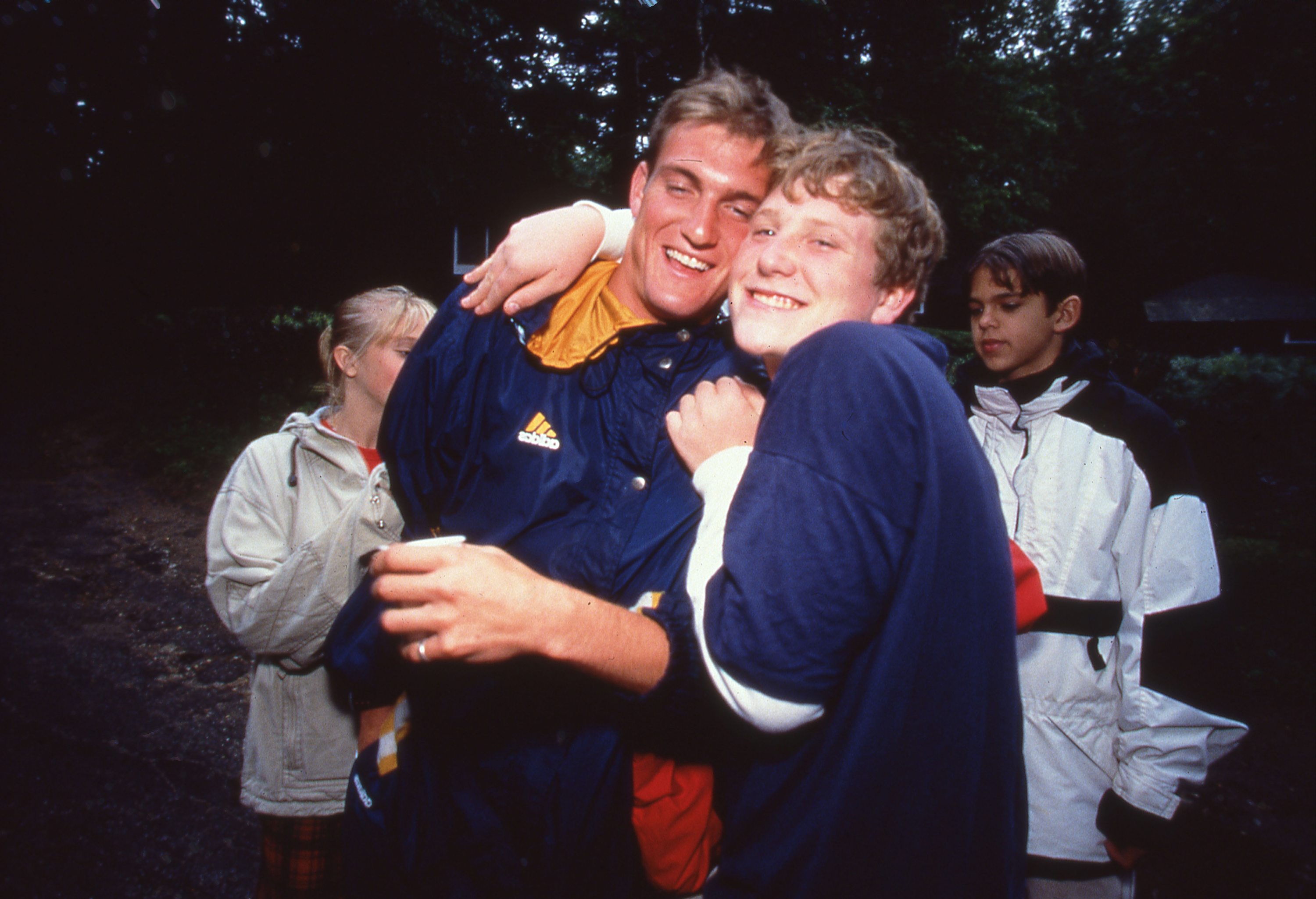
Luna (counselor, Hill 4 girls’ cabin, who requested VICE not use her last name): I grew up camping. My parents took me to family Bible camp when I was three, that was the first time I went to summer camp. I went to camps every summer after that and loved it. I stayed in camping for another year or two after Waziyatah.
Rhett Bachner (counselor, Grove 4 boys’ cabin): I had been involved in summer camps for over ten years and I had been a counselor at camps for quite a while at that point. I was at a different camp, but the project was being hosted at Waziyatah. For me, I was so proud of camp culture at that point that if someone was going to do a reality show about what I have always believed is a really special industry and opportunity for young people, I was going to be a part of it no matter what camp it was at.
I was pretty militant about it, once I knew that there was an opportunity there, I was anxious to be involved. I was like, “If you’re doing anything that’s going to depict the stories about summer camp, you have to at least call me.” I didn’t even realize I was going to be on the show, I just wanted to be involved as a consultant or something.
Luna: You have to remember the context of it. Reality TV was a pretty new thing. The only reference I had was Real World on MTV. I wouldn’t have done Real World, I would have felt really uncomfortable with that. But I felt that with Disney Channel, it was probably going to be really benign and really nice. And I just figured that this was the type of opportunity that doesn’t come into someone’s life very often, why would you not do it?
Ross: What was different between Bug Juice and The Real World was that these kids were going to camp and things were going to happen regardless of whether or not we were going to make a TV show about them. On the Real World, there was a manufactured situation that happened to be unscripted. Not criticizing that, that show’s been on for a long time and it does a great job for what it does. But it had been popular enough that Disney was interested in trying something in this new unscripted arena. Up to that point, it was doing scripted shows and movies and animated projects. The only documentary-style things it was doing was behind-the-scenes documentaries about the makings of Disney feature films.
Thompson: The whole reality genre was still very young. We weren’t up against any bad press or any stigma that came along with the genre. The ability to get people excited about the project was a lot easier than if we decided to sell it today. I think parents and kids would be so jaded from seeing all of the reality television that they’ve seen today that it would be a different kind of a show.
Ross: One other thing that was unique about it was that those 13- and 14-year-old kids were not producing themselves. They were being exactly who they were. Nowadays, when people sign up for a TV show, they’ve seen too many of them, and they know that if they start a fight or they slap somebody or something, they’re going to get the screen time. In those days, people didn’t know, and I think teenagers are much less prone to produce themselves than adults are. That was one of the things that set it apart from The Real World. The kids weren’t self-conscious about what they were doing in front of the cameras.
Bachner: I remember the cameras always being a presence. I think that’s part of why they were able to capture the purity of what the experience was like for some of those kids. I think if that show had to be made today, it might be constructed in a different way so that they could guarantee a certain amount of content in a certain amount of time because that’s what budget constraints tend to dictate for a lot of nonfiction programs. But the producers were pretty adamant about not interfering with the experience that these kids were having.
Luna: [Things felt natural] for the most part. It was summer camp. The kids were kids and summer camp was summer camp in many ways. The producers kept saying, “The camera people will be like a fly on the wall.” No, no, no, no, no. Everyone was aware that there was a film crew there. They became a part of the camp experience the way anything that you add to a camp experience can become a part of it. They blended, but it was a little different.
Bachner: If anything, from my perspective, it enhanced the experience because often times when you have a camera on you, it can sort of be a catalyst to have you look inward and see what you can get from the experience. I felt like it was a great tool for me to get more out of the bonds and more out of the growth that you want to see in your kids.
Korsen: At first it was really hard to get used to and then the cameras and machines and everything just sort of became background. We were kids, so there was this added element of excitement that we knew we were being filmed all the time.
Boyle: I was kind of on the show less than all the kids in that bunk. I think it was a combination of being kind of camera shy and also being a little too-cool-for-school maybe, which is really just another form of insecurity, being a 13-year-old in the middle of puberty and everything else.
Thompson: What made the first season so special on that show was the fact that the kids didn’t know what to expect. They had no recourse but to be anybody else but themselves.
Ross: It was kind of a risk for [Disney] because on an unscripted show, you can’t control the outcome, so Disney was very used to finely-tuning, and crafting within an inch of their life each episode so that they had the Disney swagger, the Disney meaning, the Disney imprint all over them. So it was actually a big risk for [the company] to do something where it couldn’t control it.
Bachner: Having the experience I do now and knowing how shows like this have to be made, I felt like it was as true to documentary as it could be. I felt like the directors always had the kids’ best interest in mind and never wanted them to feel like they were helping shape a storyline.
“What made the first season so special on that show was the fact that the kids didn’t know what to expect. They had no recourse but to be anybody else but themselves.”—Bug Juice co-creator J. Rupert Thompson
Korsen: There was no interference, it was definitely just us in our natural environment. I think though—and this gave me some good insight into reality television in general— that you just get hours and hours of film and then you narrow that down into what you’re going to use, and when you do that, you can kind of create characters.
Wool: I think they mostly got it right. They got a lot of the traditions in there, you know, the Color War, the dances, the camp-wide sleepover they have of the end of the year, and the sadness of everyone going away on the last day and all of that stuff.
Boyle: Both Connor and I were pretty friendly, outgoing people, but we were definitely skeptical of the whole camp thing going in. I think we probably thought camp was kind of a lame thing. But the thing about the bunk that was assembled, at least on the boys’ side, was that it was just such a special group of kids. Rhett is just like one of the all-time great camp counselors. Once we got there, we got comfortable pretty quickly and started enjoying ourselves.
Wool: Rhett was an amazing camp counselor and he made it really special. That night in the last episode, he got us to do this trust walk with our eyes closed in the dark, that was definitely an amazing moment. I actually think the film crew did a really great job of getting all of these incredibly special moments on camera. But they filmed everything. They probably left the cabin each night like five minutes after lights out. They were there from the beginning to the end each day.
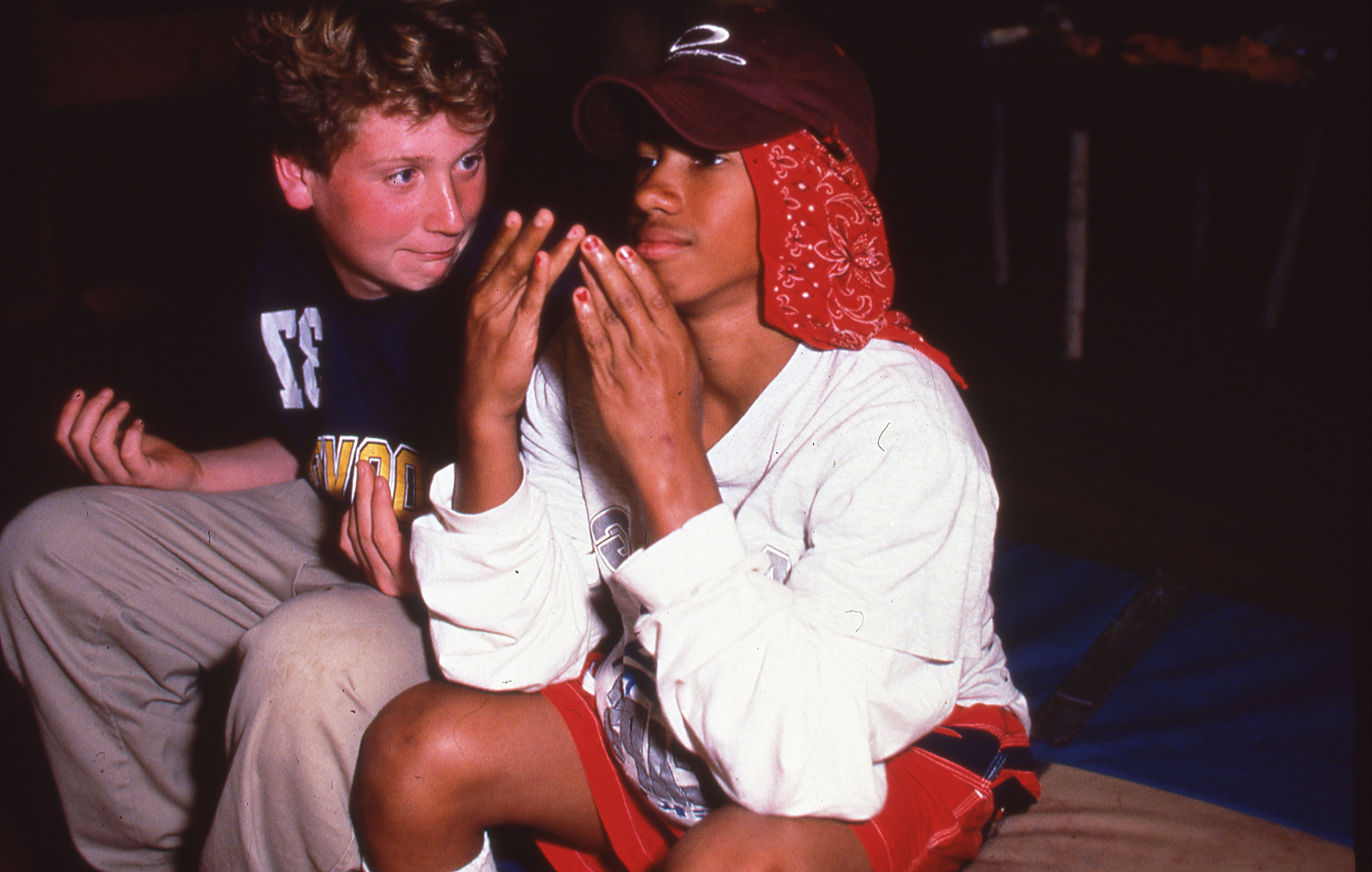
Thompson: The biggest thing was just to be able to capture how kids grow up differently in the summer at summer camp. What makes summer camp different from school? What is it about that environment that makes you grow up faster, more differently? That was the main gist of what we were hoping to do. Camp is a place where you’re allowed to take risks that you might not be able to take at home. But it’s still in a supervised environment, so the kinds of things that you do or that you think you’re getting away with, that helps you grow in a way that you might not be able to do at school.
Everything from the counselors waking you up in the middle of the night and taking you on a crazy walk through the woods and they say you’re not supposed to be doing it but of course everyone knows that you’re doing it, but the kids think it’s this big secret thing and that they’re breaking the rules. It’s all about those crazy antics and shenanigans that you do at summer camp that are just different. As a result, kids are finding out about themselves that they wouldn’t learn in school because they’re able to be a little bit more carefree than they are otherwise.
Bachner: [The campers] were just giving feedback on the experience they were having, but because camp is what it is, the stories just present themselves. It’s often the simplest stuff, like for a kid who is less athletic to finally conquer a ropes course. It’s the simplest of stories but the highest of stakes for that kid in that moment, and it’s just all there for you every day because the conceit of camp is to just challenge kids to grow and to build confidence. And then when you’re at a co-ed camp and you’ve got the relationship stuff built in as well as kids are learning about how that element works, there was just never a shortage of storylines, they didn’t need to create anything.
“Camp is a place where you’re allowed to take risks that you might not be able to take at home. But it’s still in a supervised environment, so the kinds of things that you do or that you think you’re getting away with, that helps you grow in a way that you might not be able to do at school.”—Thompson
Thompson: Connor and Stephanie in season one, and you know Asa, and the Candy Godfather, and Jason Wool, the crazy kid that he was—all of those stories were just genuine stories. Because it was our first season of shooting a show like that, too, we didn’t really have a lot of experience telling stories. As a result, I think that led to us being even more genuine with the whole thing.
Ross: One of my favorite stories about Bug Juice is we had been tracking one of the romances and we got toward the end of the summer, we actually captured the first tender kiss between the boy and the girl who had been kind of falling in love with each other in a very teenage kind of way. It was completely innocent and I wouldn’t even call it PG-13. It was G, maybe PG-rated. We edited that storyline into the rough cuts of the show.
When [staff at] Disney saw that kiss, they said, “Oh you can’t put that in there.” And we said, “Why? This is so beautiful. It’s such a great story that everybody can relate to.” And they said, “But we can’t show real kids actually kissing.” And I said, “But on your scripted shows, people have fallen in love, they go on dates, they have their first kiss all the time.” And they said, “Yes, because the parents of the kids watching will accept it because they know it’s not real.” But because it was real, it was too risky for them to show and they made us cut it out. I always regretted that. I think nowadays, that would be nothing, but in 1997, when we were editing the show, that was just too much for them to handle at the time.
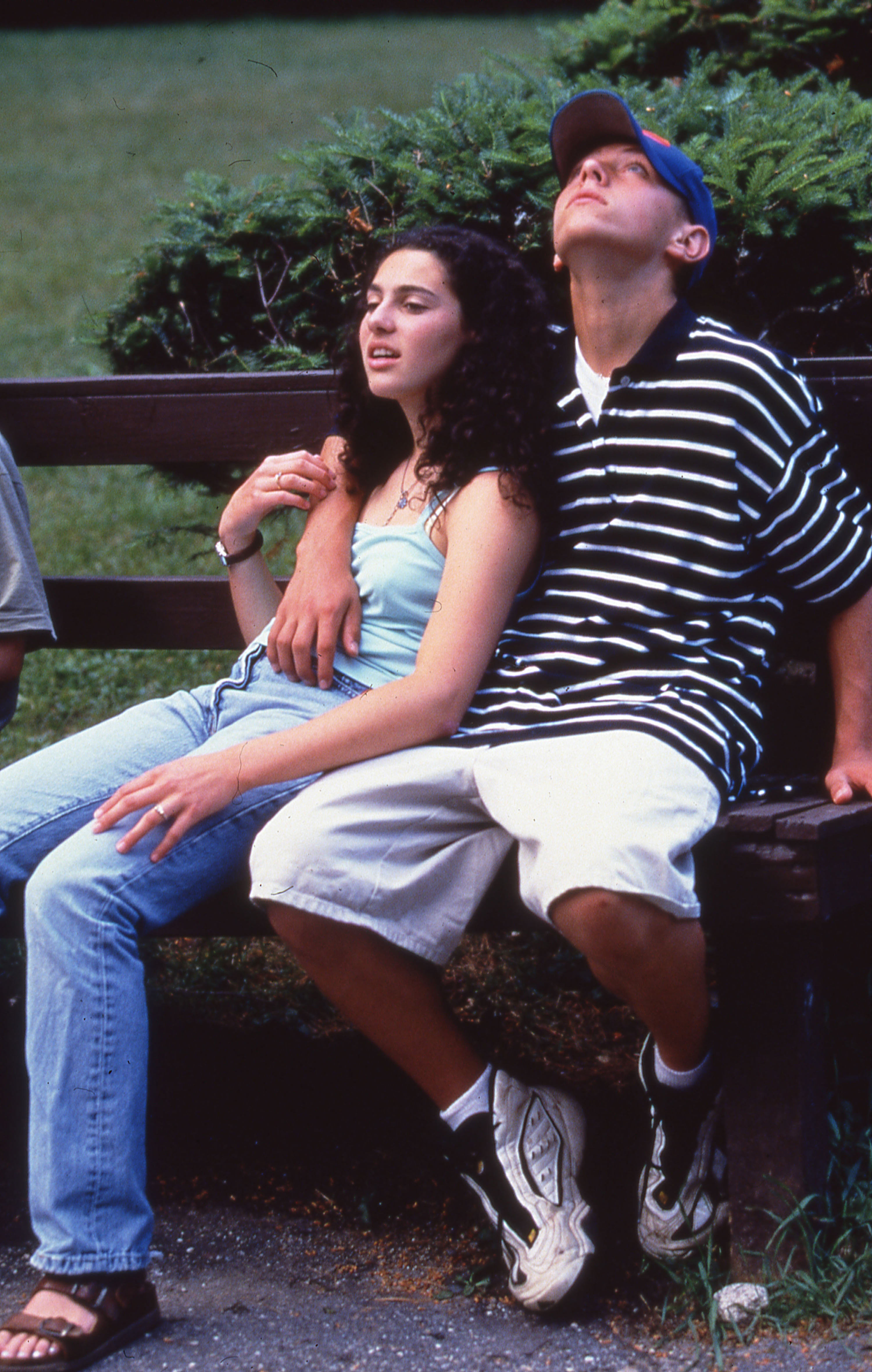
Wool:. There was the fact that several kids from my bunk had little romances with the people from the girls’ bunk, so that created a bit of a link between the two cabins, too. The funny thing about the romance thing, too, is that I had this little relationship with [fellow camper] Alison in the first part, but that whole thing lasted for maybe like a week and a half. She and I had a little romance and then she got cold on me and went out with Ev, so I like hated Ev for a good week. But then they were over and things came back with me and Alison, so they didn’t show the full dynamic of how crazy that part was back then, like how your world can be all about another person and then you’re only there for like four weeks, but it felt like an eternity.
Bachner: Individuality—I thought [the crew] did a fantastic job [showing that]. What I think camp is best at is creating an environment where kids can find out who they really are. When you strip away a lot of the pressures that come with a traditional school environment, or even removing parental figures who may be sending certain messages that can drive kids in a certain direction— even if the intention is always good—it often takes removing kids from those environments and bringing them to a place where, if they wanted to start over or express certain interests or express certain fears, they feel comfortable doing it. I thought [the show] did a really good job of illustrating that without even being too earnest. They featured stories about kids who were really interested in drama but were perhaps nervous with what comes with that. They illustrated the athlete who’s maybe trying to find something more meaningful than just sports themselves. It just seemed like they were willing to make a concerted effort to showcase all different types of kids that are searching to find out who they really are. It would’ve been easier to just solely focus on the “popular” kid and his girlfriend, but it felt to me like they found better content, maybe more relatable content, certainly more meaningful content in telling a wider range of stories that were perhaps more representative of all kids.

Wool: I wasn’t really into the water. The water there was disgusting, it was like a thick pea soup. I was also into sports at that time. I was really into track and field at that point in my life. So I was kind of a nice mixture. There were some people, like [fellow camper] Caitlin, she wasn’t much of an outdoor person at all. But there were plenty of things you could do there if you didn’t want to be outside. There was creative writing, there was pottery. I did a lot of arts and crafts there.
Thompson: I think the reason that the viewer loved the show so much was that there was a character in that show that every kid could relate to. We had so many different types of kids on that show, and they were all kind of aspirational. You had Connor who was the dreamboat kid who was adorable and the 1-800 number that Waziyatah had set up for their families to call, they had like a $10,000- to $12,000-a-month phone bill that year after the show came out with crazy fans because they wanted to talk to Connor and Stephanie. It’s like teen fluffernutter, it’s what they want to watch. And there was Caitlin, who was the sort of artistic kid who didn’t always fit in but was an incredible artist. There are a lot of kids out there like her, she was super relatable. I think that’s the reason that the show did so well because we really did have some genuine kids on there and it really came across that way.
Ross: There was the story of Caitlin, who was homesick and she felt like an outsider and she wanted to home and her parents told her that she had to stay. By the end of camp she had really blossomed because she forced herself to confront the unfamiliar. I think that story in particular is one of the most important things that summer camp does for most people. Most people are a little shy and they’re a little scared and they don’t feel like they’re a part of the group. That storyline showed that if you give it a little bit, then it comes back at you tenfold.
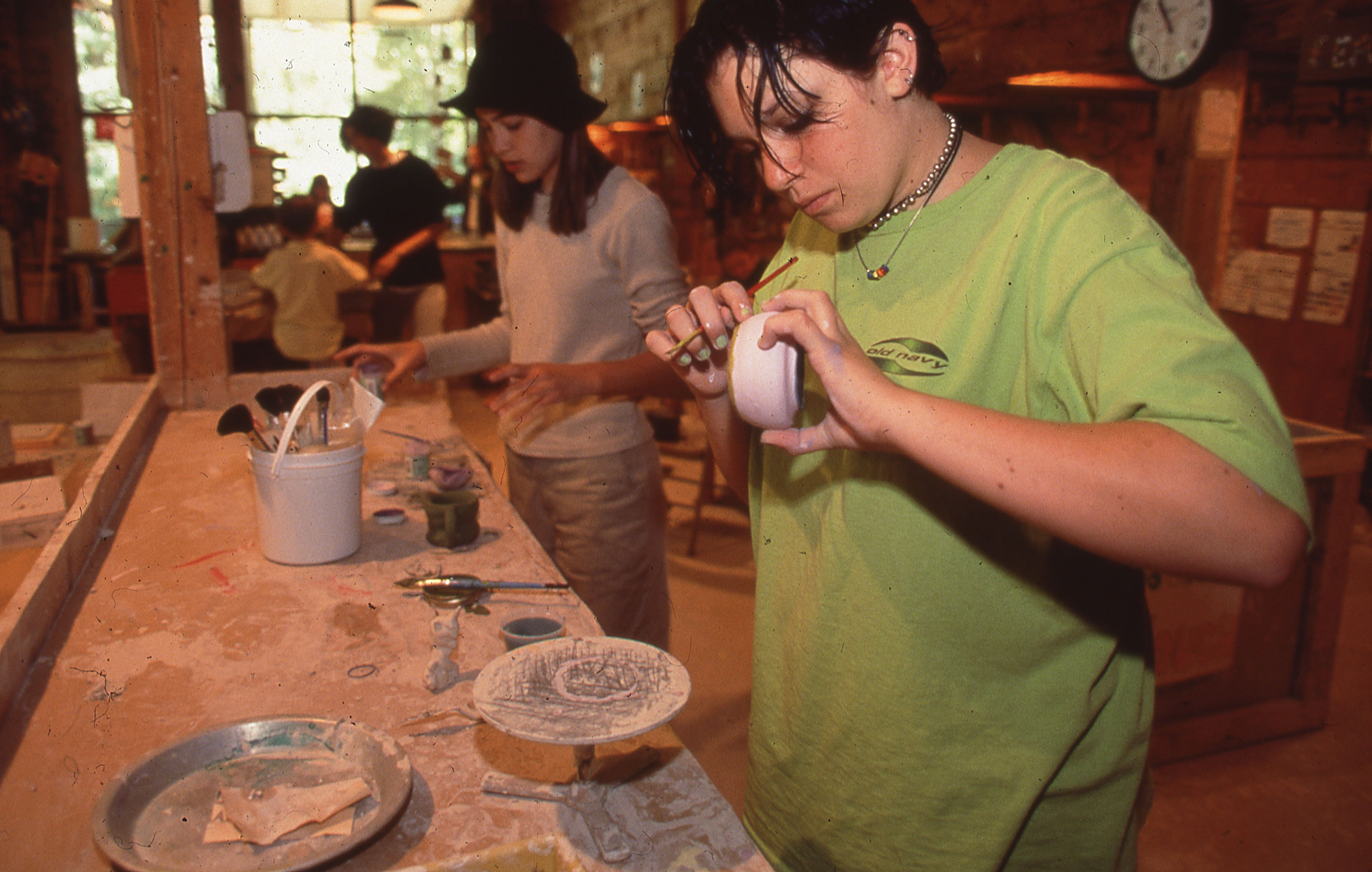
Bachner: I think Malik was an exceptional story. He was someone who took full advantage of what camp can provide, which is a place to overcome fears and build confidence that you may not be able to otherwise.
Ross: All summer long he tries to get up on waterskis, and there’s a sequence when he does finally get up and everybody cheers. Those are the moments, whether it’s on TV or not, that you remember your whole life and they give you a foundation to take risks and to challenge yourself and go for it in life.
Bachner: Seeing him not only learn to swim, but waterski in the final moments of his summer was like one of the proudest moments I’ve ever had in camping.

Korsen: The experience that really stood out to me is when we went on a canoe trip. I did a lot of that stuff as a kid, but it was cool to be with some of my friends who had never done that, and to be kind of cheering them on when they’re in a bit of an uncomfortable position. There was a thunderstorm that happened when we were out in the middle of the lake. That was a pretty dramatic and exciting moment. I don’t remember if in the moment it was really that exciting, but I remember in the show it was really exciting.
Boyle: The things I remember the most also happened to be major storylines on the show. Like that day bushwhacking and getting lost on the mountain and everyone going crazy and someone twisting their ankle.
Thompson: Mount Blue was an overnight trip that the kids took with the wilderness counselors. Both cabins went on this trip and they learned how to use a compass and orienteering, which is when you learn how to use a map and get from point A to point B and try to figure out where you are in the woods based on those tools. You really have to trust yourselves and the map and the compass in order to get to your destination.
So the group split into two different groups and the stories that came from that were really extraordinary because the kids all had different experiences. There were kids who were comfortable in the woods to kids who had never been in the woods in their lives. And we saw a range of emotion from kids who were just hacking around and being irresponsible who knew that they were going to be fine, to kids who were genuinely freaking out and refusing to move because they thought that they were lost. And the counselors weren’t there, they shadowed the kids, so the kids were by themselves and they had to figure it out. Of course, the counselors were only like 50 yards up the slope, but because it was so thick, they weren’t visible.
But Caitlin, for example, she sat down and she refused to move. And over time I think she realized that she wasn’t going to get any closer to her destination by just not moving. But it was a great story of just overcoming fears and having the wherewithal to trust the people who you’re with. Shooting that episode was one of the most unforgettable experiences that I’ve ever had because it was like being in Lord of the Flies. These kids were freaking out. And we’re just sitting there observing it and they’re asking us for help and we’re just being quiet saying, “Sorry, can’t help ya.” And it’s one thing when an adult is asking you for help, but it’s another thing when a kid’s asking you for help, it’s a little more difficult.
Boyle: Inevitably, there’s so much [footage] that’s not on there, and the things that are focused on might seem unfair. I think Caitlin is a good example of this. Caitlin’s portrayal through the whole bushwhacking scene and wanting to go home and everything—that definitely happened, all of that was real. But 30 to 50 percent of her screen time was focused on that, and that wasn’t 50 percent of her experience at camp. I think it just depends on the person of how clearly they feel they were portrayed but I think the producers and the editors did a pretty admirable job in hindsight, especially compared to a lot of the reality TV of today which is pretty explicitly sensationalized and scripted. Watching the show, even today still feels authentic to me.
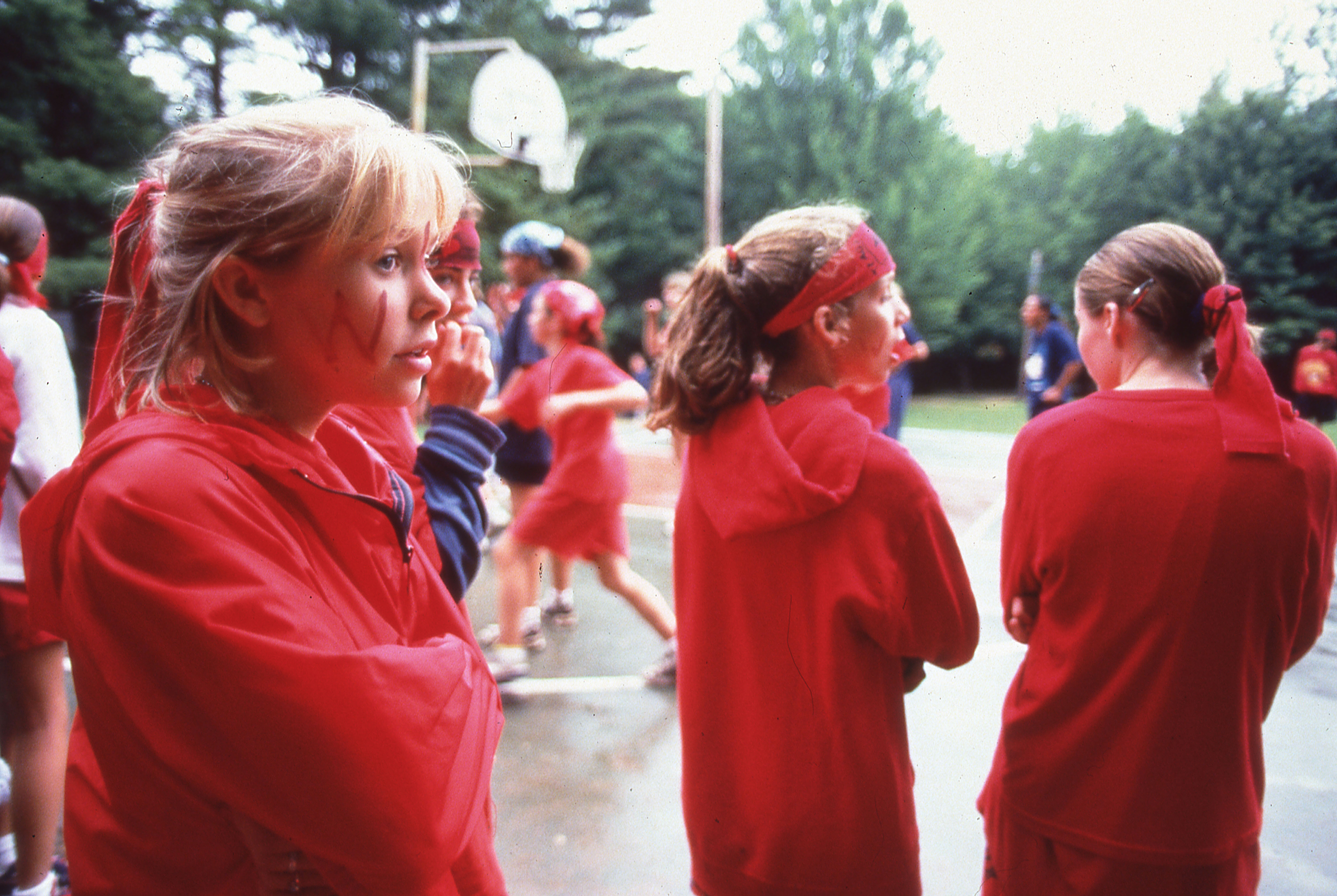
Bachner: There’s a whole subculture with the counselors, but I think that would have been less Disney Channel friendly. Camp is as much of a growing experience for the counselors as it is for the kids, it’s just that a lot of our growth is happening behind the scenes. Those elements were left out, and for good reason.
Wool: It was a different time. I remember that there was some sort of release that we had to sign but I don’t remember my parents or anyone really caring about it. As a lawyer now, it makes me cringe a little bit. I think part of it was that we knew it was on the Disney Channel and that they were not going to show anything particularly risqué. I always joked though that they probably have a whole stockpile of footage to destroy our lives if they wanted to. They left a camcorder in our cabin for a really long time and there are a bunch of hormonal boys so of course there were some times when we would film each other farting and all of that kind of stuff. They’re probably sitting on a goldmine.
Boyle: We became tight with the crew and they were a lot of fun. If anything, I think we were pretty over-comfortable and were oversharing. They gave us our own cameras, and you see little clips of that cut throughout the show. But man, I hope those tapes were destroyed. We were just running around being wild kids, you know? And we would think it’s funny to send those tapes back to the crew to see what they would think of it and they’d be like, “Guys, c’mon.” But honestly, there was nothing too malicious on there. No terrible pranks or anything, it was all pretty standard 13-year-old boy stuff.
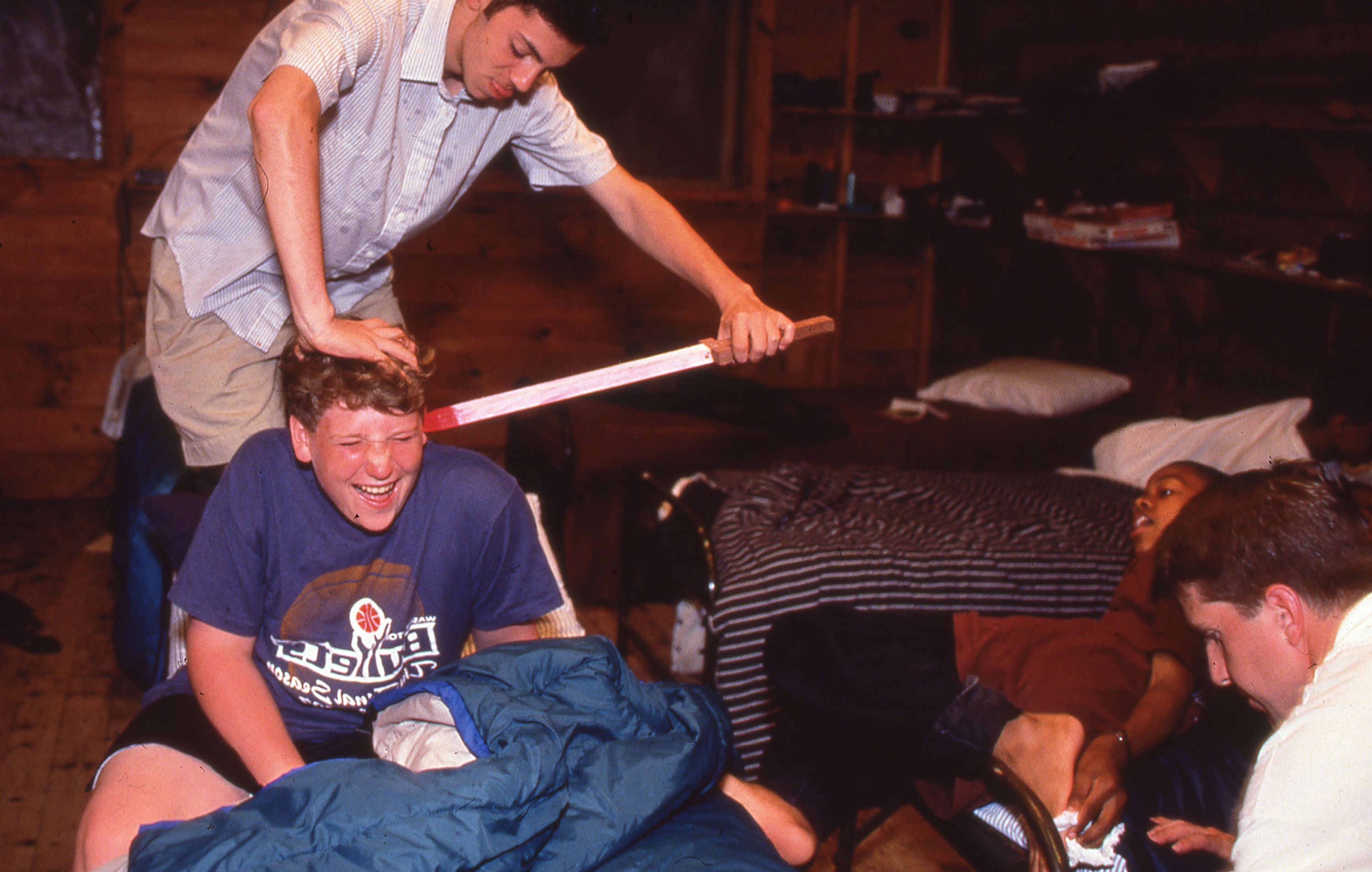
Luna: It was very weird for me to watch the show. And I was an adult. I would imagine that that was really challenging for a lot of the kids. My hunch is that I think the boys had a different experience than the girls did. I don’t know for sure, that’s just my hunch.
Korsen: The more I think about it, the more it was probably a very accurate portrayal. I was a ditzy, boy-crazy 12-year-old girl, and I think that that’s just who I was at the time. I guess sometimes I wish I had not been that way, but I turned out OK. You know, I don’t think most people get that opportunity to see themselves at that age. It was the beginning of middle school, it’s just an awkward time in your life. You kind of think you know everything, but you don’t know anything at all.
Boyle: Interestingly, the whole Seymour Butts Chronicles [a video series that the boys bunk made with their camcorder], which in hindsight is misogynistic and inappropriate, and somehow they put some of that stuff in the actual show. But that was a pretty good example. We definitely had like 18 chapters of that, where we would just zoom in on peoples’ butts. So just silly stuff like that.
Luna: When I think about parts of it I think, maybe I would handle that differently. At the same time, I sort of have to give myself a break because for who I was at that age and what the job was, I think I did a good job. You kind of need someone who is young and inexperienced in [camp counselor] positions sometimes. But that’s weird to be locked into that and to watch on screen.
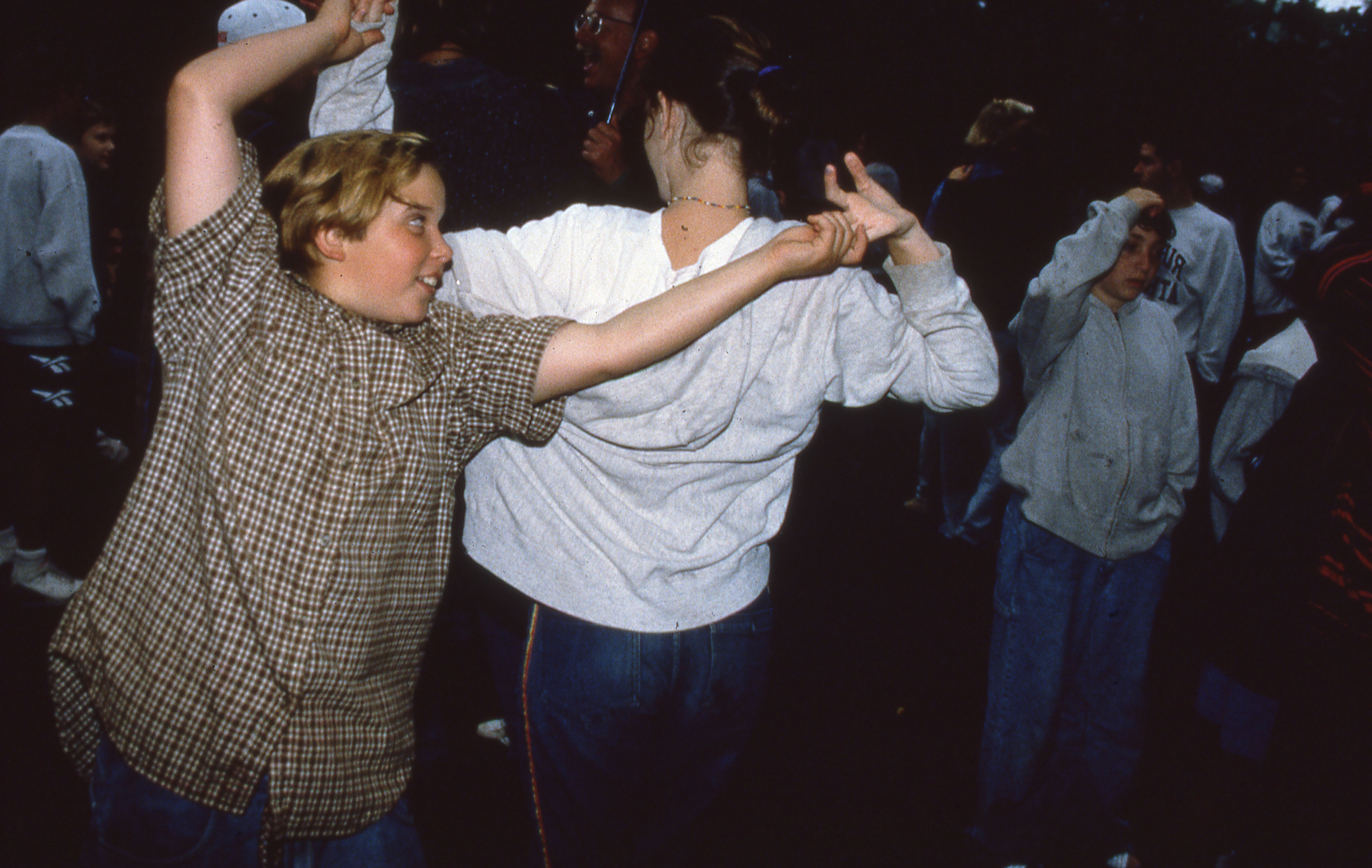
Wool: I thought it was great, I actually wished that I was on it more. I was kind of a little bit of an attention-seeker. I was very buddy-buddy with the crew, too. Like Stacey, the sound guy, he was my bud, and there was a whole other element there that you couldn’t see on the show because they couldn’t show the camera people or the crew interacting with us, but I definitely had friendships with them. I had been filmed so often, and I couldn’t figure out what they had done with all of the footage. But other than that, I loved the response.
Boyle: I could sign on to AOL Instant Messenger and there would be like a hundred messages coming in off the bat from strangers. For me that was kind of cool. In high school, too. I got a lot of attention from it, and most of it positive. Nobody gave me that much of a hard time for it. It helped my integration into the high school environment, too. Some of the upperclassmen would see the show and think it was cool. Especially if I was with Connor because he was genuinely recognizable, but we would go to the mall and without a doubt, girls would come up to us. When you’re 13, that was pretty cool.
Korsen: I grew up in rural Maine in a very poor town, so most families didn’t have the Disney Channel. So people didn’t really see it. My closest friends of course saw it and it was a big topic of conversation and they thought it was hilarious and got really into it.
Wool: Overnight, people recognized me. I remember, I grew up in New York City and I was walking by the Met and there was this girl I was going out with and she was like literally in the process of breaking up with me after we had gone out for like three weeks so I was all sad and devastated. But while it was happening, a group of girls came up next to me and were like, “Are you Jason from Bug Juice?” And I was like, This is amazing and I’m also having like a terrible day.
Korsen: When I was in college, I remember bringing the VHS tapes back to my dorm after Christmas break or something. My roommates and I watched the whole show and got really into it. They did a great job, we were all crying on the last day of camp.

Boyle: I think because it was in this earlier era of reality television, it was still this novel thing. They weren’t looking to make anyone look bad. Even some of the [less happy moments] were presented in a way that was like, This is stuff that happens with kids, and you need to work through it.
Ross: I think it’s accurate to say that we had a unanimous positive response from the parents. We told the parents that we weren’t going to sugarcoat things, and that we didn’t want their kids to feel embarrassed about being on the show but that for sure embarrassing moments were going to happen. But we would pay them off with some success in the end. So if something unflattering was happening, we needed to be able to tell that story, but then we would show that the person coming around, or overcoming, or succeeding by the end of the episode. I still believe that you need to be able to tell the true story, but you want to find the positive part of the story so that you swing it at the end. I told them, “I know that these kids are going to have to get into college when this is over, you guys are going to have to go to work or church or the grocery store and hold your heads up high, and we’re going to make sure that we honor that.” They believed us, and we came through.
Thompson: [The reception] was extraordinary. It was remarkable. We had thank you letters from parents from more than several kids thanking us for showing their kids in the light that we showed them in and watching themselves and either liking the way they looked or really hating the way they looked and then completely changing their whole sense of being. Ev Boyle, for example, he was the kid who walked around and had his pants around his ankles pretending he was a gangster and he saw himself on TV and was like, What was I doing? His mom said in the letter that he completely changed his act.
Boyle: At the time [of the show’s release], I remember being pretty self-conscious about it. I actually didn’t remember this until I was hanging out with Doug not long ago. I guess my mom sent an email to him right after the show was premiering and it was like a really positive email. In it, she mentioned that seeing myself on camera had caused me to reflect on both my appearance and my way of speaking. So I got into speech therapy lessons after that because I was mumbling a lot and kind of had a lisp. And then my clothes, too. I was wearing like size 60-inch waist jeans and a hat all the time. I was basically kind of a punk. I do remember, and this was the year between middle school and high school, but the way I dressed changed radically that year. I’m not sure if that was the result of being myself on the show or not, I think it was a mix of stuff.
Thompson: The whole mantra that we continually reminded the kids of was that nobody is going to look like an idiot on this show, we’re not trying to make anyone look bad, we’re trying to make all of you guys look like heroes because you’re all figuring things out. We’re trying to show how much courage you have just by figuring your shit out.
Boyle: Social media also didn’t exist at that point. It was really just AOL Instant Messenger and message boards. So, there was attention, but there wasn’t really an overload of attention. If they were to end up doing the show again with kids, no matter how thoughtfully you construct the show itself, the reaction to it will just take on a life of its own, and it will be very different. I think it’s inevitable that there will just be a lot of abuse online and more hate. We experienced some, but that stuff couldn’t be amplified in the same way.
Luna: It was genuinely a weird experience. I have mixed feelings about it. I do think that the show was really cute and really fun and good for camp and good for kids. But the experience of being on the show was super odd. I think that that’s also interesting. It’s been helpful in my life. There have been things I’ve learned from that experience that I wouldn’t have figured out otherwise. But it’s always been an experience that I haven’t quite known what to do with.
Korsen: I think if someone wanted to make a reality TV show about my child, I would say no because of what of reality TV has become now. But at the time, it seemed harmless, and it really was. I’ve never had any sort of negative backlash, it’s all been really positive. Whenever anyone says, “Oh, you were on Bug Juice?” it’s always a very positive response.
Boyle: From my perspective, I had really fond memories of that summer and the kind of friendships that I made, many of which last me to this day. Jon [Adler ]and Andy [White] both are really close friends of mine. I was at Jon’s wedding in the fall actually, and Andy was there, too. His wife surprised him and us by having the band learn the Bug Juice theme song. At some point during the night, they start playing the song and Jon and Andy and I start singing along and everything. Those bonds are certainly very strong. Connor is still a really good friend of mine, too. I was the best man at his wedding maybe five years ago.
Korsen: Those summers were really special—the connection you create and the attachment you have to your friends and counselors and your cabin. It seems like such a long experience, but it’s condensed, only like four weeks of your life. I think they did a great job of capturing that feeling, of how special camp is.
Boyle: The thing that stands out most to me is the strength of the bunk, and the bonds that we formed there. Especially that first session. It was like the tightest group of guys. I think that was reflected on the show, but that was real. We talked about everything, we cried together, laughed, we just shared so much. That definitely sticks with me. It still makes me a little emotional today, just thinking about that crew.
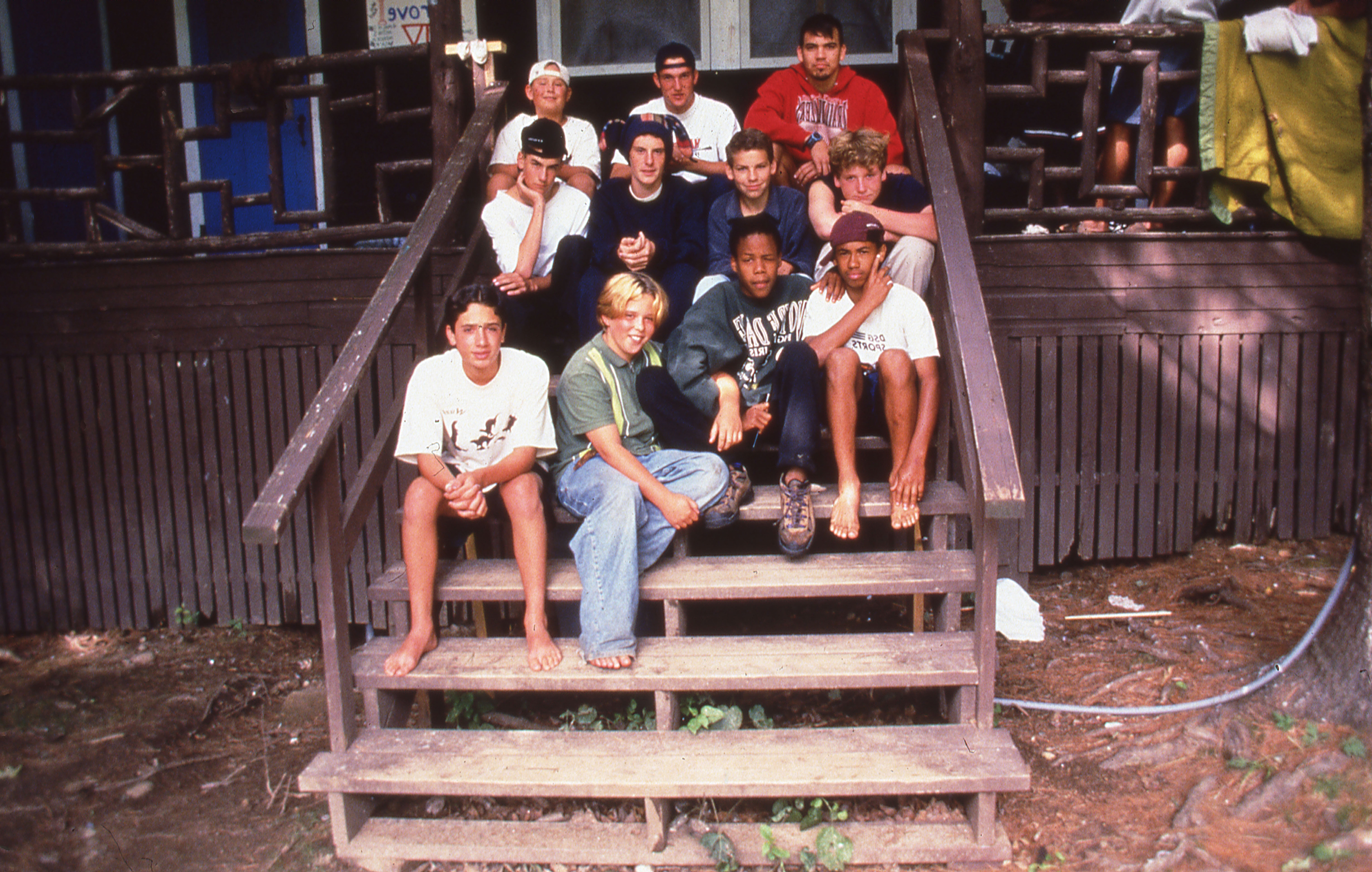
Bachner: I think it was ahead of its time from an authenticity standpoint, because that’s what’s coming back now. Networks often are looking for projects that feel more authentic because we got away from a lot of that with a lot of formatted content. But digital and Youtube have sort of reminded folks of the importance of content that is real and doesn’t feel manufactured. In that sense I think Bug Juice was really ahead of its time.
Thompson: It wasn’t only a show that changed the lives of the kids who were on it, but it changed and improved the lives of the people who worked on it. There’s something about working with kids, it’s just so much more meaningful. Especially when you’re making a documentary about kids and observing their lives, I don’t know, I think just your parental instincts kick in, whether you’re a 20-year-old PA working on the show or you’re 40. You care so much about the kids and I think that level of caring really showed on the show.
Ross: I really do believe that it was a pioneering type of show. It was on the leading edge of the wave that was soon to become reality TV. I think that why it was so successful and why it had such an impact with viewers was that it was 100 percent genuine and authentic. We didn’t manufacture anything. It was all real. I think it set the gold standard for documentary TV.
Bachner: I think anyone who was there or part of the show is particularly proud to be associated with it because of the purity of the experience. I think it’s the way that good documentaries are still made now.
I’ve been pitching the idea of a Bug Juice reunion for a decade.
The new season of Bug Juice: My Adventures at Camp premieres on Disney Channel Monday, July 16 at 7:30 EST.
These interviews have been edited for length and clarity.
More
From VICE
-

Screenshot: Reddit -

Screenshot: Shaun Cichacki -

Collage by VICE -

Collage by VICE
